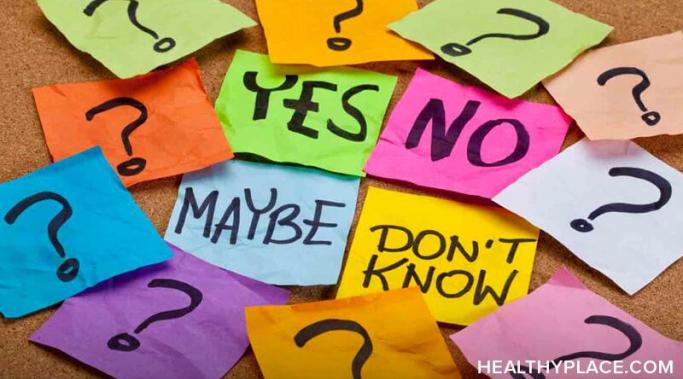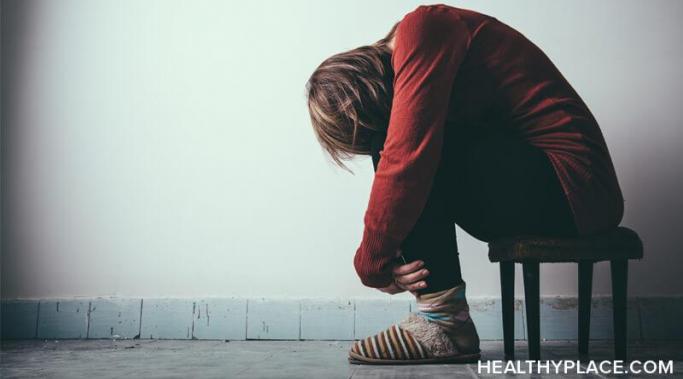Blogs
Anxiety disorders cause us to ruminate and rehash, running past conversations, events, situations, actions, and emotions over and over in our heads. And doing so makes anxiety skyrocket.
Eating disorder resolutions for the new year should focus on health, not food, weight, or exercise. All too often in this culture, New Year's resolutions focus on those things. It's just another confirmation that society as a whole is image-obsessed to an unhealthy extreme.
Using personal boundaries to survive the holidays is a good idea. Let's face it, the holidays aren't always a blissful time for everyone. Grief, dysfunctional family relationships, and old resentments can rear their ugly heads this season. It can be especially difficult to manage painful feelings when the messages you see and hear all around you say this should be the happiest time of the year. One thing that can be especially helpful as you survive the holiday season is to practice using personal boundaries.
The Christmas story helps me deal with holiday anxiety. So many people find this time of year supremely stressful when it really should be the exact opposite. Because there is no better time than now to revisit the topic of holiday anxiety, I want to go into a little more detail about how I use the Christmas story to frame this time of year in terms of calm, not anxiety.
Depression at work during the holidays may be slightly different than during the rest of the year. The holidays are a tough time for people in general, causing otherwise happy people to get a case of depression. For chronically-depressed people, the holidays are when their depression tends to get worse. Combine that with work—most of which is overtime—and the situation gets all the harder to handle. Here are a few things you can do to cope with depression at work during the holidays.
Why do you need to take care of your mental health over the holidays? For many people, the holiday season is a highlight of the year; with the holidays comes spending time with the ones we love, a vacation from work (albeit brief), reconnecting with old friends, and enough food and drinks to fill us until the new year. However, for other people, the holidays can be a nerve-wracking period filled with turmoil, negative interpersonal interactions, and complete and utter mental exhaustion. It is essential to stay mindful of the disparities that people experience during this time of year and to remain sensitive to the experiences of others. For those grappling with mental health difficulties, or any obstacles in general over the holidays, here are some tips for coping.
How do you determine if you're depressed or just sad? Navigating emotions while recovering from mental illness is incredibly tricky. For me, mental illness completely broke my internal emotional compass. Before I experienced depression, I could identify emotions like sadness, worry, and joy fairly easily. But after I experienced depression, it became nearly impossible to distinguish between depression and sadness or nervousness and anxiety. Even though I've been recovering for years, this is still one of my biggest struggles as a human being. Luckily, all those years in therapy have taught me a few things, and I'd like to share them with you.
You need a holiday meditation because although the holiday season can be a relaxing, enjoyable time, there are also elements of it that can contribute to anxiety. Buying gifts on a tight budget, visiting family you don't see often, traveling to visit family, or even just having more free time than usual can lead to anxiety.
Why do we need to help loved ones with depression during the holidays? While the holiday season takes a toll on everyone to varying degrees, it can be an especially tough time for those of us struggling with depression and other mental health issues. If you have a friend or relative who's struggling, there are a lot of ways — both big and small — to provide just a bit of extra support to help get them through the season.
Triggers and emotional cravings relating to mental difficulties are very common for those of us in recovery during the holiday season. We previously discussed three different types of cravings individuals might face in addiction recovery, one of the most complex of these being emotional cravings. This week I want to dive deeper into the concept of emotional cravings and just how prominent they can be during the notoriously stressful holiday season.










I believe she will only be able to rid herself of her demons, and hopefully her BPD as well, when she's ready to confront the abuse of her father. If she can put the blame where it belongs, she may stop projecting that victim/perpetrator cycle on the present men in her life. These demons are a metaphor for the purgatory she has created for herself. That reality has consequences in the real world, but it need not be real in the tangible sense. Exorcising her demons will require the expenditure of real physical energy and probably the destruction of aspects of her personality. If this ever happens, and it's possible but not probable, then these demons will evaporate. They are only as real as one's personality is real. In short, reality is not the question, it's what you make of the things you feel to be real.